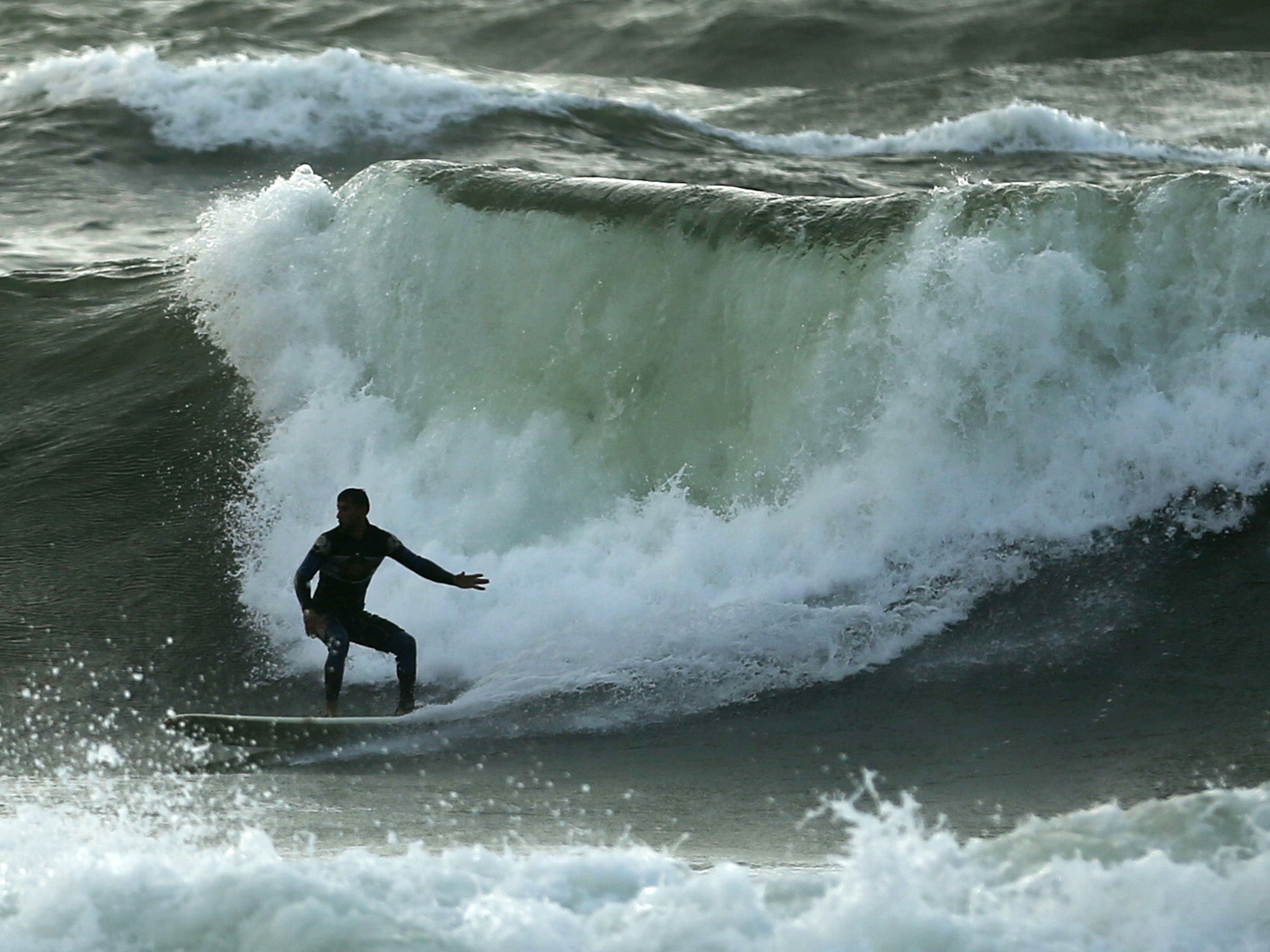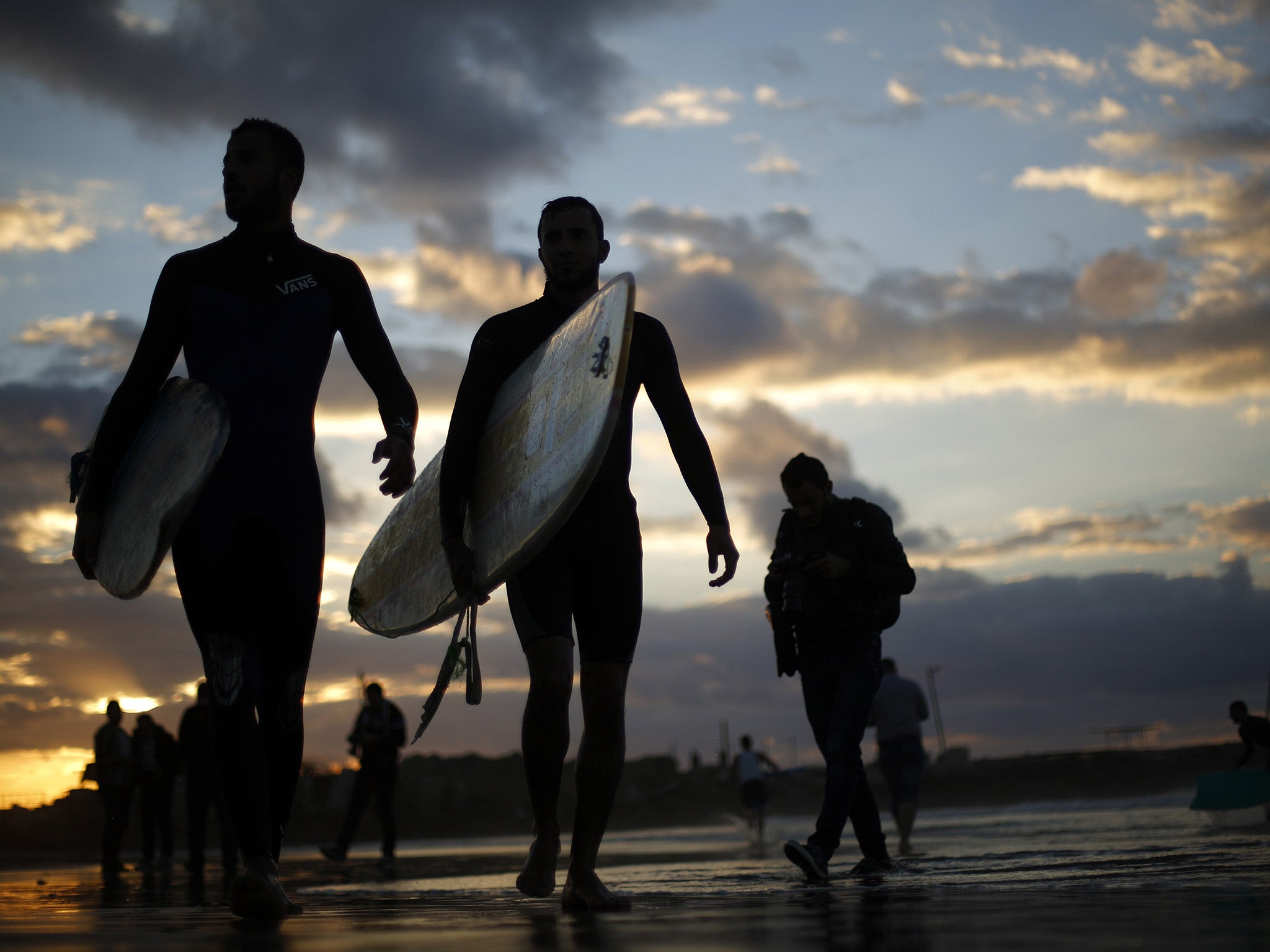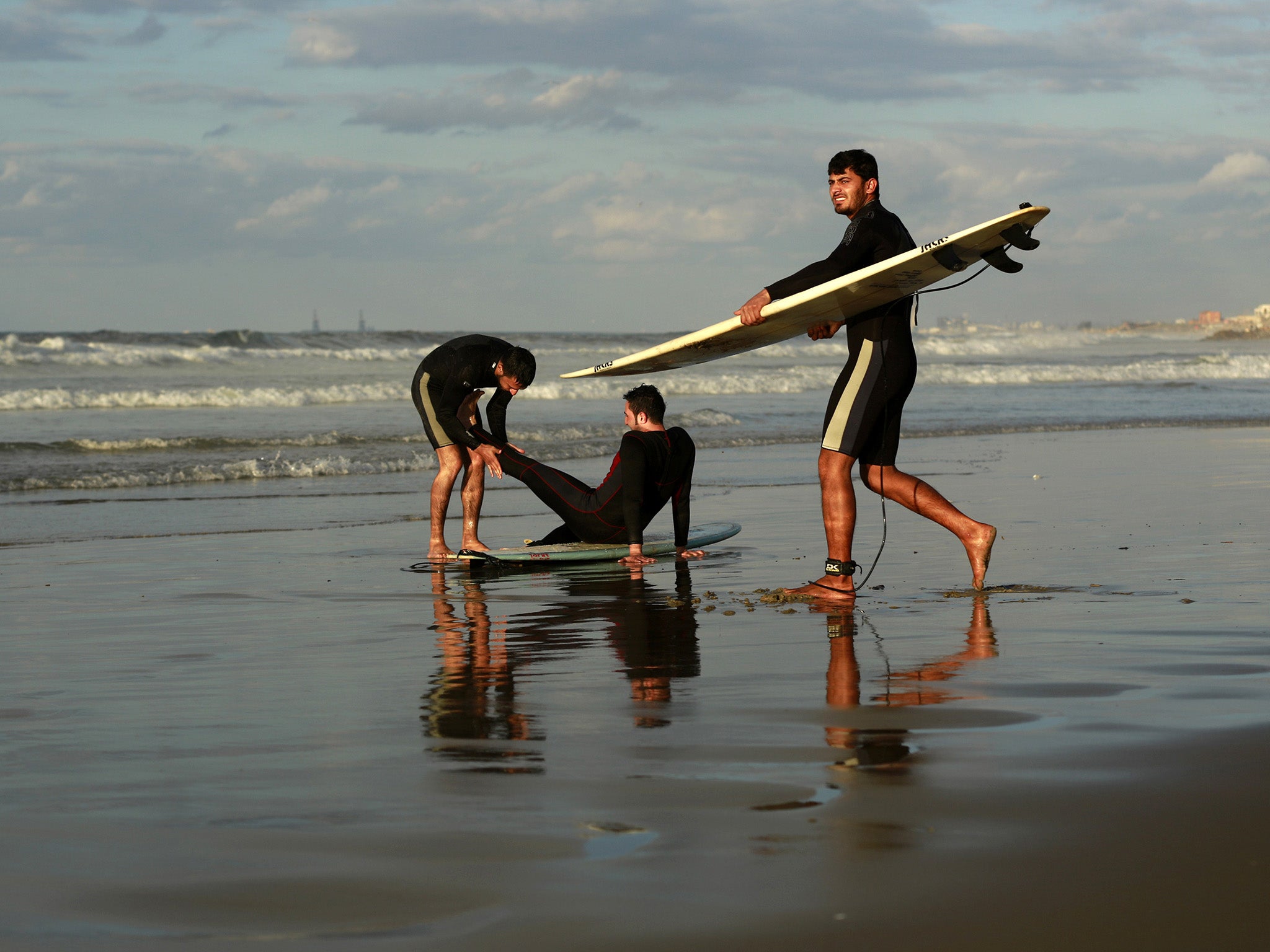In a place where surfboards are illegal, a surf club in Gaza has had to improvise
Director Philip Gnadt's film follows a group of Palestinians determined to take to the waves. He was drawn to the subject because it was refreshing to hear something other than ‘occupation’ and ‘terrorism’. For Andy Martin, the film is both a grim reminder of life in Gaza and a message of hope
Your support helps us to tell the story
From reproductive rights to climate change to Big Tech, The Independent is on the ground when the story is developing. Whether it's investigating the financials of Elon Musk's pro-Trump PAC or producing our latest documentary, 'The A Word', which shines a light on the American women fighting for reproductive rights, we know how important it is to parse out the facts from the messaging.
At such a critical moment in US history, we need reporters on the ground. Your donation allows us to keep sending journalists to speak to both sides of the story.
The Independent is trusted by Americans across the entire political spectrum. And unlike many other quality news outlets, we choose not to lock Americans out of our reporting and analysis with paywalls. We believe quality journalism should be available to everyone, paid for by those who can afford it.
Your support makes all the difference.Umberto Eco, late professor of semiotics and author of Foucault’s Pendulum and The Name of the Rose, once suggested a whole list of oxymoronic book titles. The one that sticks in my mind is “Antarctic Agriculture”. Not much to say on that subject. And you’d think that something similar would apply to “Surfing in Gaza”. But there you would be wrong – as is amply demonstrated by the beautiful and poignant documentary film, Gaza Surf Club (director Philip Gnadt). Gaza, it turns out, has decent waves. And a handful of competent Palestinian surfers. Are they – since it seems impossible to avoid the question – “antisemitic”? The answer is, no, but maybe they are, fundamentally, anti-semiotic.
A brief shout-out to the glorious People’s Film Club of Hackney – and therefore its founder, Kate Hodkinson – who recently put the film on and kindly invited me to introduce it. They specialise in “new and unexpected narratives” and “screen powerful films, accompanied by speakers who understand the issues best." I was surprised, given his pro-Palestine stance, they didn’t ask Jeremy Corbyn. Just for once, he was neither present, nor involved. You will not see the Labour leader in shorts in this film.
Seeing Gaza Surf Club, I realised that there is a hitherto unacknowledged overlap between Palestinians and Polynesians. After Captain Cook, most Hawaiians were dispossessed and wiped out, either intentionally or otherwise. Then the islands were subjected to a coup mounted by wealthy Americans, annexed, and finally incorporated as the 50th state of the United States.

Surfing, despite the best efforts of evangelical Puritans, who denounced it as sinful, survived. As a native Hawaiian once said to me: “The beach is all we have left.” The Palestinians in Gaza Surf Club – marginalised, disenfranchised, endangered, but stoical, with a disarming sense of humour – were saying something very similar. In the case of Hawaii, a few years back, Congress, under Bill Clinton, finally issued an apology (a “resolution apology”) for colonising the place. This hasn’t yet happened where Palestine is concerned, unless you count Noam Chomsky as a representative of the American government.
By pure chance – Jung would call it synchronicity – I had recently been in touch with Ibrahim Arafat, one of the stars of the film. Ibrahim, who looks a lot like Ronaldo, after many abortive attempts and spending large sums of money, and the intervention of his American guardian angel, Matthew Olsen (founder of Explore Corps, and ambassador of Surfers for Peace) – spoiler alert! – finally makes it out to Hawaii.
He is currently in Houston, Texas, studying nursing, while working in construction. It will be obvious to anyone seeing this film, that nursing and construction are the two most in-demand areas of employment in Gaza. I ended up exchanging emails with him thanks to Deya’ Leonard Dresner, an American-Palestinian who is the director of the Leonard Education Organisation, bringing young Palestinians to America for their college education.

Like many another participant in a documentary film, Ibrahim said the film left out “all the important stuff”. True, but I think a lot of it is there by implication. No one needs to say, Gaza is a prison. This is Shawshank Redemption with waves. When Ibrahim gets out, it’s like he is escaping, like Houdini miraculously managing to release himself from all the knots and the chains. His mission, when he leaves, is to learn about how to make boards in Hawaii, and to bring boards and board-making equipment with him back to Gaza. But has he succeeded in this mission?
Set aside the whole dubious history of Israel, the events of 1948 that the Palestinians refer to as the Nakba (or “Catastrophe”), the Six Day War, the occupation of the West Bank and East Jerusalem, the continued imperial expansion and slow-motion ethnic cleansing known euphemistically as “settlement”. Even set aside, most recently, the “Nation State” law that spells out, reiterates and reinforces a condition of apartheid. Do you want to know the final straw? They won’t allow surfboards into Gaza. They are obviously part of some sinister Hamas-inspired conspiracy. They may exhibit coded subversive messages on stickers applied to their decks, such as “Life’s a beach”, or “Surf’s Up, Dude”.
Ibrahim got the boards in Hawaii OK, but he tells me “we couldn’t send them to Gaza because we didn’t get permits for that from the Israel government”. At the risk of labouring the point, let me repeat that: Israel prohibits the importation of surfboards. Israel is, in effect, outlawing surfing, just as the buttoned-up East Coast evangelicals tried to do in Hawaii. “I met a lot of people after the film,” Ibrahim wrote to me, “and they wanted to support us and build the club and they offered to send boards to Gaza, but Israel prevents any kind of equipment or boards getting to Gaza.” No boards, no surfing. By a strange concatenation of historical circumstances, surfing, in the 20th century, became synonymous with hedonism. So by extension Israel is outlawing the pleasure principle in Gaza. Only pain – what Freud calls the “reality principle” – is permissible. Or compulsory.
Surfing used to be a fantasy, a myth, the dream of the landlocked (I should know, being born in Forest Gate, East London). Surfing was a song, sung first by Hawaiian bards, and later by the Beach Boys. Surfing, in films like Big Wednesday, or Point Break – the original in which Keanu Reeves learns to surf in approximately five minutes – was pure Hollywood. Now surfing is reality, perhaps the last remnant of a reality that is fast receding, and everything else is fantasy.
As the Gaza Surf Club film demonstrates, the spirit of surfing is manifestly our natural state. The appeal of surfing, the nexus with the wave, is transnational, universal. Surfing is a practical exercise in transcendence.
Anti-semitism is real, but also liable to be over-diagnosed and mis-attributed. Are the Gaza surfers anti-semitic? Is Jeremy Corbyn? No, but they are anti-semiotic. Semitism (like its opposite) depends on semiotics, or the dissemination of myths and meanings. We are constantly mythifying ourselves – and others – by stereotyping, or conjuring up imaginary timeless identities. The implicit drift of a documentary film is to draw our attention to the fictions that otherwise tend to occupy our minds. And our minds are at risk of becoming yet another occupied territory.

Israel – as Edward Said (Orientalism) and Rashid Khalidi (Resurrecting Empire) have demonstrated – has been brilliant at semiotics, at selling (especially in the US) a narrative about its own existence, which goes back to David and Goliath and beyond. But at its core it’s another form of stereotyping, fairy tales we tell ourselves, a mix of deification and demonisation. The Bible is nothing but a constellation of legends to which we have accorded quasi-sacred status. At the same time, Palestinians (mirror-images of the “Philistines”, those hostile and mysterious “others” without a culture) have been on the receiving end of a narrative which they did not choose. They are being mythified to death.
Hence the curious kinship between those two arch metaphysicians, exponents of a brand of anarchistic epistemology, Donald Trump and Benjamin Netanyahu. Both believe that truth is not truth, but rather (as Nietzsche would say) “a mobile army of metaphors, metonyms and anthropomorphisms”. But with the emphasis on “army” as anything but a metaphor. This is myth being fired out of the barrel of a very big gun.
Gaza Surf Club, as Kate Hodkinson says, is a reminder of the “grim reality of life” for the Gazans. And it thereby gets away from stereotypes. The director, Philip Gnadt, said he was drawn to the subject because “it was refreshing to hear something other than ‘occupation’ and ‘terrorism’ for a change.” But the film is also a powerful exercise in demythification. This is surfing as positivism, impatient with abstraction and rhetoric. The oldest surfer in the crew, Rajab, aged 42, says at one point, “We have no hope. And if you think there is hope, please point it out so we can search for it. Where is the hope?” Hope is non-empirical. Let’s stick to the facts. He probably has the funniest line in the whole film in which he makes the case that in the event of a hurricane, he will rush to look after his surfboards rather than his children, “because I can replace children, but I cannot replace surfboards”.
The surfers are predominantly guys but there is one superb girl surfer, Sabah, who is squeezed out when she “becomes a woman”, but heroically battles back again, supported by a rebel father. A patriarch who is non-patriarcha
Surfing is not perfect. Nobody ever said it was. It’s just as flawed, venal, vicious, even murderous, and futile, as any other sphere of human activity. And it’s just as feel-good, benevolent, creative, life-enhancing, and awareness-raising. One thing has always struck me about Hawaii and surfing in general: you think at first it’s something totally marginal, peripheral, but it turns out to be more like a microcosm of society in general with a lot of hard truths. And you might think surfing in Gaza is even more tangential. This film shows that it isn’t. Surfing and Gaza are synonymous, united in their oceanic feeling.
Kate Hodkinson said that she wanted people “to share the humanity of the people of Gaza rather than reducing them to numbers in an international conflict”. And if you want a clear example of the universality of the surfing mentality, you only have to look at Ibrahim Arafat when he says that, no matter what, “when the waves are good, that’s it: I HAVE to go surfing! I can always go to work later”. And then adds, later, that “the hardest thing is going back to work after the beach”.
One more thing that my correspondence with Ibrahim Arafat brought home to me. There are no borders. There are (this is his surf-inflected spelling) only “boarders”, ie we alone are responsible for surfing those borders into existence in the first place, and we can erase them too. As Jean-Paul Sartre neatly pointed out in his one known homage to surfing (in Being and Nothingness): “The ideal of sliding is therefore a sliding that does not leave any trace: that is, sliding on water.”
Andy Martin is the author of ‘Reacher Said Nothing: Lee Child and the Making of Make Me’. He teaches at the University of Cambridge. The People’s Film Club can be found on Twitter @PeoplesFilmClub and at the Institute of Light, Hackney’s ‘cheapest cinema’. Ibrahim Arafat can be found on Instagram at ibrahimnihad

Join our commenting forum
Join thought-provoking conversations, follow other Independent readers and see their replies
Comments